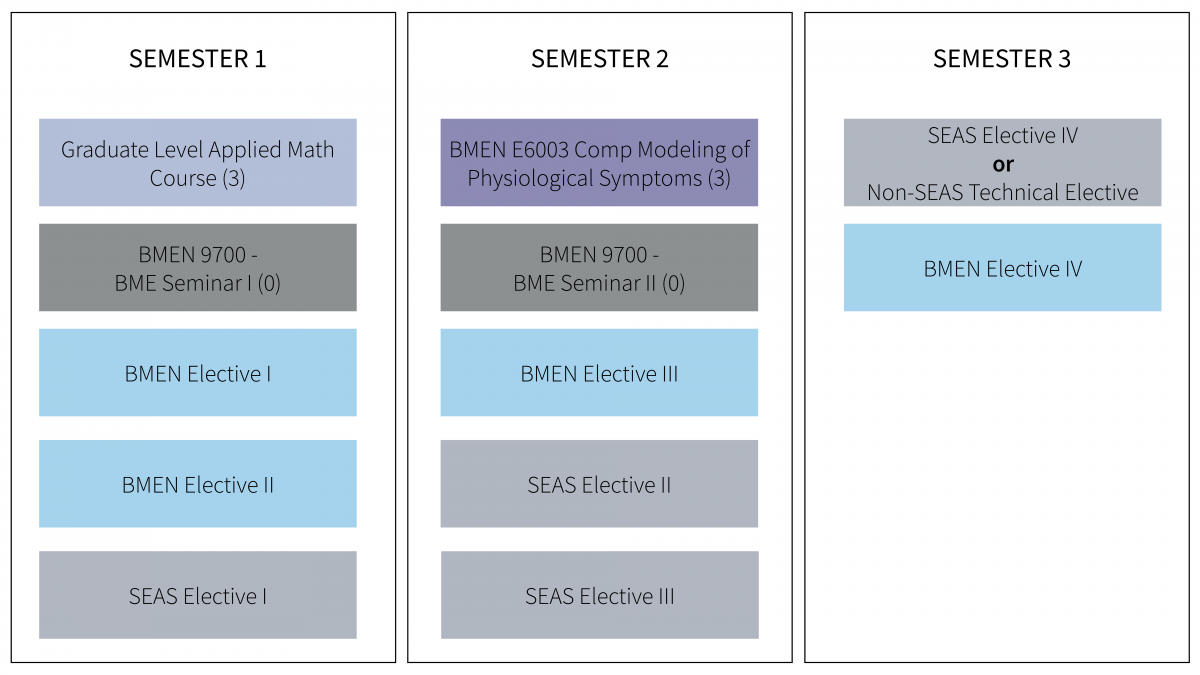MS Program Curriculum Requirements
MS students need 30 credits
MS students select a program of 30 credits of graduate courses (4000 level or above) appropriate to their career goals. Course selection is completed in consultation with an appointed faculty academic advisor. This program must include the course in computational modeling of physiological systems (BMEN E6003); two semesters of biomedical engineering seminar (BMEN E9700); at least four other biomedical engineering courses; and at least one graduate-level applied mathematics course (excluding statistics). Most MS students complete their degree over 3 semesters (i.e., Fall 1, Spring, Fall 2) and participate in internships or research experiences over the summer.
Master’s students interested in pursuing research can choose up to 6 credits (2 semesters) of research under the guidance of a BME faculty member. Students may also pursue BME-related research with other faculty in SEAS or at CUIMC. It is the responsibility of the student to contact individual faculty to find research opportunities. Research can be done on a volunteer basis or for credit. Students who receive research stipends or paid summer research fellowships may not also do research for credit. If a Master’s student is interested in conducting research, it is in their best interest to begin contacting research advisors as early as possible in the semester. A thesis based on experimental, computational, or analytical research is optional. Students wishing to pursue the Master’s Thesis option should register for BMEN E9100 Master’s Research and consult with their BME faculty advisor.
Master’s candidates are self-funded and must complete the aforementioned coursework with a minimum GPA of 2.5 to be eligible for degree conferral. After completion of the MS degree requirements, students must apply for graduation through the registrar’s office using this form.
It is recommended that students without an undergraduate degree in BME or Biology take BMEN E4001 and E4002 as part of their MS degree requirements.
For information on specific courses, see the following:
Total credits - 30 credits ≈ 10 classes
Required Courses (18 credits)
- BMEN E6003 Comp Modeling of Physiological Systems
- 1 Graduate Level Applied Math course (>4000 level, not statistics)
- 4 BME Graduate Classes (4000 level or higher)
- 2 semesters BMEN 9700 Graduate Seminar
Technical Electives (12 credits)
- Content should be BME-related
- 3 Courses in SEAS (4000 level or higher, includes BME courses)
- 1 graduate level course permitted outside of SEAS (with academic advisor approval)
MS Elective Concentrations
The Master of Science program in Biomedical Engineering offers students great flexibility in tailoring their program to their specific interests and goals. Students may either develop their own sequence of courses in an area of specialization (the Standard Track) or select from among eight suggested elective concentrations. MORE
MS 3-Semester Sample Schedule
(Click to enlarge image)
Course Types
- Computational Modeling of Physiological Symptoms E6003 (3): Advanced computational modeling and quantitative analysis of selected physiological systems from molecules to organs. Topics may include cell signaling, molecular transport, excitable membranes, respiratory physiology, nerve transmission, circulatory control, auditory signal processing, muscle physiology, data collection and analysis.
- Graduate Level Applied Math Course (3): Any non-statistics applied mathematics course (APMA4000 level or higher). See options here.
- BMEN 9700 - BME Seminar (0): Guest speakers from other institutions, Columbia faculty, and students within the Department who are advanced in their studies frequently offer sessions.
- BMEN Elective: BME Graduate Level Course. Any course in the BMEN department (4000 level or higher). See details on concentration areas below, and a complete course listing here.
- SEAS Elective: Engineering Technical Elective. Any course in SEAS (4000 level or higher) subject to advisor approval.
- Non-SEAS Technical Elective: Any course in another science department (4000 level or higher) subject to advisor approval.

